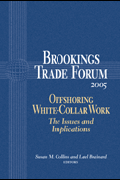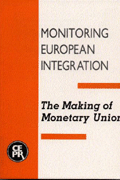Studies in this week’s Hutchins Roundup find that monetary policy easing is not associated with lower bank profits, offshore activity increases domestic employment, and more.
Want to receive the Hutchins Roundup as an email? Sign up here to get it in your inbox every Thursday.
Monetary policy easing is not associated with lower bank profits
The relationship between monetary policy and bank profitability is theoretically ambiguous. A decrease in short-term interest rates or a flattening of the yield curve may increase profits by reducing funding costs and increasing borrower creditworthiness, or may lower profits by decreasing net interest income. Using data from commercial banks and the European Central Bank (ECB) on the euro area, Carlo Altavilla, Miguel Boucinha, and José-Luis Peydró of the ECB find little effect of monetary policy easing on overall bank profits, because the positive impact on loan loss provisions and non-interest income largely offset the decrease in net interest income. A protracted period of low interest rates might have a negative effect on profits, they say, but that effect only appears after many years and is offset by improved macroeconomic conditions. Finally, using an event study analysis, they find that accommodative monetary policies lead to higher bank stock returns and lower credit risk.
Offshore activity increases domestic employment
There is little agreement among academic economists about how offshoring by multinationals affects domestic employment. Using new bilateral tax treaties—which lower the cost of offshoring by eliminating double-taxation of income earned abroad—as natural experiments, Brian Kovak of Carnegie Mellon, Lindsay Oldenski of Georgetown, and Nicholas Sly of the Kansas City Fed find that a 10 percent increase in employment at an offshore affiliate leads to a 1.8 percent increase in employment at the U.S. firm. At the industry and regional levels, the employment effects are, on average, still positive but smaller because employment losses in purely domestic firms offset some of the gains. Overall, greater offshore activity raises net employment by U.S. firms, but not without job losses at certain firms and worker reallocation, they say.
Public uncertainty about central bank policy increases credit costs and reduces output
Uncertainty about a central bank’s actions may dampen the effectiveness of its policies. Lucas Husted, John Rogers, and Bo Sun of the Federal Reserve Board introduce a new method to measure uncertainty about the Fed’s policy actions. Unlike existing market-based measures, which only reflect the perceptions of a narrow group of individuals, the authors’ measure draws upon 6,000 newspaper articles and captures the perceptions of the broader public, they explain. They show that increases in monetary policy uncertainty raise credit costs and reduce output, and these effects are about as large as those of contractionary monetary policy. If the Fed’s plan to gradually increase interest rates also lowers uncertainty about monetary policy, they say, the reduction in uncertainty can help neutralize the contractionary effects of the rate increases.
Chart of the week: Median US family net worth rebounds, but remains well below pre-crisis levels

Quote of the week:
“Now, we’ve had a long period of undershoot. I would want to emphasize that until this year, 2017, although we missed our inflation target to the low side, it was not a mystery why those undershoots had occurred. The story first was substantial slack, high unemployment. And in later years, it became more centered on a huge reduction in oil prices and a large appreciation of the dollar beginning in mid-2014 that brought down import prices…” says Fed Chair Janet Yellen.
“Look, an undershoot is a concern regardless of whether you understand it or not, but it was pretty understandable until this year. But this year it’s been a surprise. Now, inflation is noisy and surprises, in a sense, shouldn’t be surprising, but it is a surprise and it’s something we’re watching closely.”








Commentary
Hutchins Roundup: Monetary policy and bank profits, offshore activity and domestic employment, and more
October 26, 2017